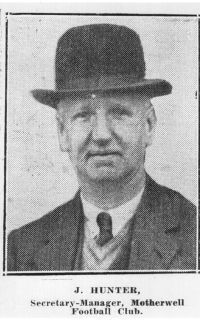The board of Motherwell accepted the resignation of club secretary John ‘Sailor’ Hunter toward the end of March 1959. It was the end of a era.
John Hunter arrived at Fir Park in 1911 and combined managerial duties with the position of secretary for over thirty years. This meant he had almost complete control of the club on a day to day basis and not only established the side in the top flight of Scottish football but secured the only league championship, which was won in 1932.
 His playing days, north and south of the border included an English League winners medal when Liverpool first won the title in 1901. His managerial career began when he was 32.
His playing days, north and south of the border included an English League winners medal when Liverpool first won the title in 1901. His managerial career began when he was 32.
A good campaign which came up a fraction short of the title first brought the runners-up spot in 1927, the highest place achieved by the club to that date. The title win of 1932 was the high point, especially as this was the only success enjoyed by a non-Old Firm side between the wars, but the level of consistency shown in finishing in the top three for eight seasons until 1934 was a remarkable achievement.
Sailor stood down as manager just after the war and passed control of team affairs on to George Stevenson, a player he himself had brought to Fir Park. Both cups were then won with Hunter as club secretary before his failing eyesight finally forced him to retire, aged 80. He had served for almost half a century.
Perseverance was a virtue finally rewarded when Motherwell collected the Scottish Cup in 1952. The club had endured a love-hate relationship with the tournament since they first reached the semi finals in 1923. On that occasion Celtic ended the run and they would prove a frequent thorn in the side of the club in years to come. They defeated Motherwell in two cup finals in the 1930s and Clyde took their turn to give the team a taste of Hampden misery in 1939. After a break enforced by the Second World War, the team needed a few years to get going but reached the cup final again in 1951 to face Celtic – the outcome was an oh so predictable defeat. But, in 1952, the Steelmen finally took the famous old trophy back to Fir Park by hammering Dundee 4-0.
While the final ended in a comfortable win, the whole cup run was outstanding. Motherwell were not drawn at home at all in the tournament and after beating Forfar in the first round, the side needed to fight back from two down to win 3-2 at St Mirren. Dunfermline were dispatched with a replay in the next round and Rangers suffered the same fate in front of a packed Fir Park. An epic semi final clash with Hearts needed three visits to Hampden with Motherwell eventually triumphing 3-1 after two 1-1 draws. That meant by the time Willie Kilmarnock lifted the cup the side had played ten games in the competition but such a huge effort was a fitting end to a cup odyssey lasting several decades. The win also meant that Sailor Hunter, the ageing club secretary, was finally able to get his hands on the cup having managed the team to three unsuccessful finals during his time in charge.
In 2016, 50 years after his death, the club ensured that his name would be forever associated with Fir Park by renaming the East stand in his honour.
Read more about Sailor in Eddie Ferguson's tribute to this True Steelman.